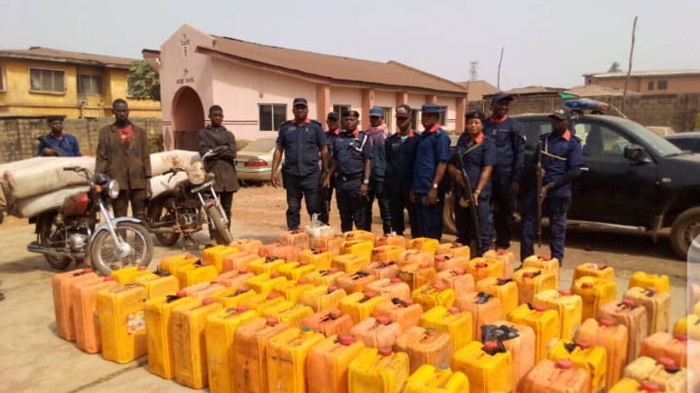An estimated 15.64 million litres of petrol are smuggled out of Nigerian daily. Nigerian petroleum products retail on average 3.7 times cheaper than those of its neighbours, which has given smugglers unfair possibilities for arbitrage.
This has led to the smuggling of an estimated 15.64 million gallons of petroleum products out of Nigeria in August 2021. This was disclosed by Chapel Hill Denham in a document titled “Dangote Refinery can provide the needed breather for Nigeria’s public finances”
The withdrawal of subsidies, according to the research, could accelerate an already pressured inflationary trend, but a stronger fiscal position’s positive spillover could lessen the impact on disadvantaged Nigerians.
What the report is saying
The report implied that 15.64 million litres on average per day are smuggled to the incentives created by fuel subsidies. The report said, ”As of August 2021, the NNPC put PMS domestic consumption at 56.44mn on average per day. In-house in Chapel Hill Denham, we believe the actual number is at least 28% lower. For context, we estimate Nigeria’s actual PMS consumption at 40.6mn litre per day on average, with the balance smuggled to neighbouring West African countries.”
The report explained why this massive smuggling operation is rampant in Nigeria. The report said, “this is possible owing to the collapse in the “Law of one price”, which states that an identical product should trade at an identical price, irrespective of the location, once the exchange rate has been factored in. Since Nigeria’s petroleum products retail at 3.7x lower on average when compared to neighbouring countries, this created undeserving arbitrage opportunities for smugglers.”
The report said, “Against that backdrop, Nigeria now effectively subsidises PMS products for the consumer in other countries while also preventing the formation of a legitimate market for cross-border PMS transportation and sale. With Dangote refinery, we believe change is imminent.”
Should Nigeria remove the fuel subsidies?
Despite the various call from international organisations such as the IMF and World Bank, President Muhammadu Buhari recently defended the maintenance of fuel subsidy.
He said “What our western allies are learning the hard way is what looks good on paper and the human consequences are two different things. My government set in motion plans to remove the subsidy late last year. After further consultation with stakeholders, and as events unfolded this year, such a move became increasingly untenable. Boosting internal production for refined products shall also help.”
The report from Chapel Hill lays some credence to this claim that there would be some negative impact to the Nigerian economy caused by fuel subsidy removal specifically regarding inflation. The report said “ Subsidy removal may exacerbate the already pressured inflationary movement but the positive pass-through of a stronger fiscal position may help limit the impact on vulnerable Nigerians. To see the potential impact of a deregulated downstream oil sector on headline inflation, we ran monthly average PMS Price data on consumer prices movements over the last 20 months, we found that a N1.0 increase in PMS Price can potentially trigger a 22bps expansion in headline inflation, a test that is significant at 5.0% level.”
However, the organization believe that more benefits can be achieved from subsidy removal, ranging from stronger oil export proceeds to better CAPEX spending and permanent solution to the incessant fuel crises in the country.
“While the preceding remains worrisome, we believe the FGN can protect the most vulnerable via a planned period of cash transfer. Nonetheless, we believe the economy can even reap a multitude of benefits from subsidy removal, ranging from stronger oil export proceeds to better CAPEX spending and permanent solution to the incessant fuel crises in the country.”
Nigeria presently ranks as the eighth nation in the world with the cheapest gasoline prices, with Nigerian consumers spending $0.42 a litre, according to the survey. This is a result of the FGN heavily subsidizing imported goods.
The report said “Going by the figures we obtained from the World Bank, Households in the bottom 40% of Nigeria’s income distribution account for less than 3.0% of all white product purchases. For proper context, 75% of all petrol products sold in Nigeria is consumed by private firms, public transportation services, government agencies, and other business entities. Against this backdrop, one can potentially conclude that subsidy may have outlived its purpose.”
What you should know
- Currently, Fuel shortages have gotten worse in Lagos and Ogun States as filling stations are now charging N185 or more per litre for Premium Motor Spirit (PMS), also known as gasoline. In addition to the new illegal pump price, according to Niarametrics, they also had to tip the gasoline attendants with N400 or more, depending on their negotiating strength.
- Nairametrics also reported that the Independent Petroleum Marketers Association of Nigeria (IPMAN) indicated that some of its members decided to close down their businesses because they no longer wanted to operate at a loss or under unfavourable circumstances.
- The closure of these petrol stations has led to the scarcity of the product and the appearance of long queues of vehicles at stations at are still open for business.















Am here, following